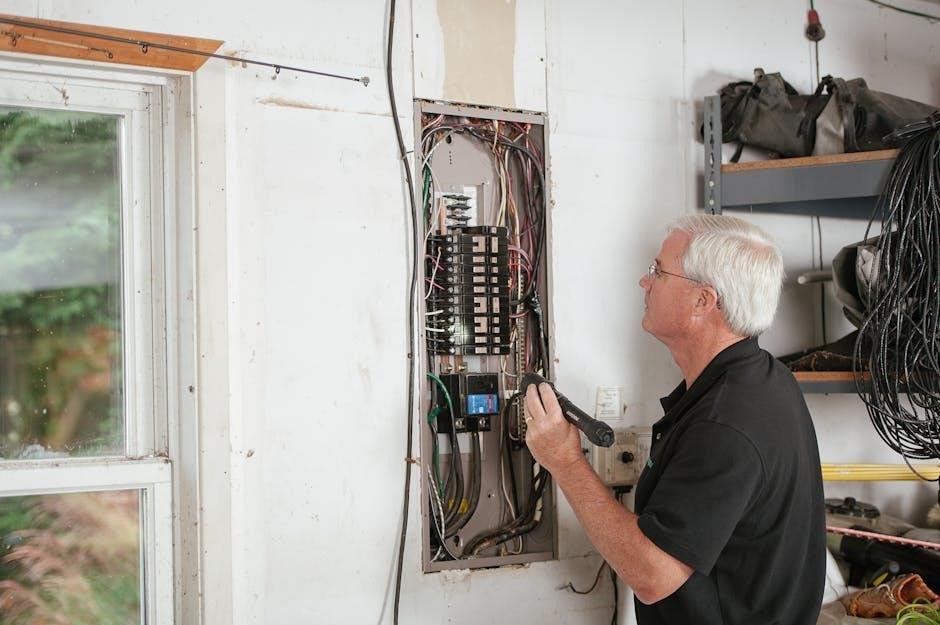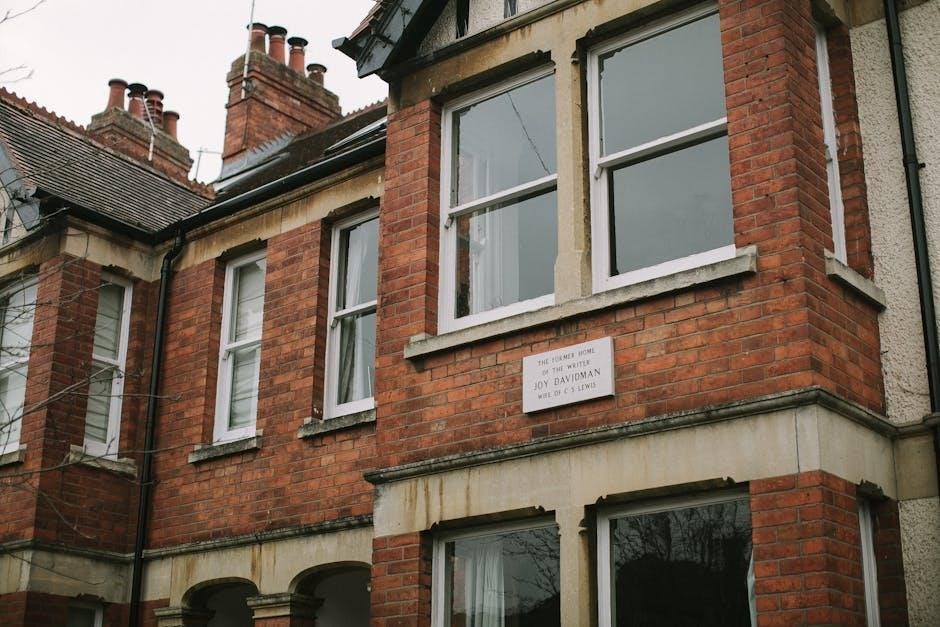The Oxford House Manual serves as the foundation for sober living, outlining democratic operations, financial self-support, and sobriety principles. It has guided thousands since 1975, evolving through editions.
1.1 Overview of the Oxford House System
The Oxford House System is a self-run, self-supported network of sober living houses for individuals recovering from alcoholism and drug addiction. Each house operates autonomously, adhering to democratic principles and financial independence. The system emphasizes accountability, sobriety, and mutual support, providing a structured environment for sustainable recovery and personal growth.
1.2 Purpose of the Manual
The Oxford House Manual provides a comprehensive guide for establishing and maintaining sober living environments. It outlines essential principles, operational guidelines, and best practices to ensure the success of each house. The manual serves as a foundational resource, empowering members to create and sustain supportive communities that foster long-term recovery and personal development.
History of the Oxford House Movement
The Oxford House Movement began in 1975, evolving into a national network of sober living houses. It has grown significantly, now in its tenth edition as of 2023.
2.1 Founding and Evolution
Oxford House was founded in 1975 as a self-help movement for recovering addicts. It evolved into a national network, with the first manual published to guide operations and ensuring sustainability. Over the years, it has expanded, now supporting thousands across the U.S. with its structured, peer-run approach to sobriety and personal growth.
2.2 Key Milestones in the Development of the Manual
The Oxford House Manual has undergone significant updates, with its 8th edition in 2017 and 10th edition in 2023. These revisions enhanced guidelines, incorporated recovery tools, and expanded the network’s reach, ensuring the manual remains relevant and effective for sober living communities nationwide.
Structure of the Oxford House Manual
The Oxford House Manual includes multiple editions, serving as a comprehensive guide for operations, with core principles like democracy and self-support, and essential forms for governance and finance.
3.1 Editions and Updates
The Oxford House Manual has been updated regularly, with its tenth edition released in 2023. Each revision reflects evolving needs, ensuring relevance and effectiveness in supporting recovery communities. Updates maintain foundational principles while addressing contemporary challenges. The manual is a living document, adapting to improve support for sober living environments.
3.2 Core Components of the Manual
The manual includes guidelines for governance, financial management, and member accountability. It provides frameworks for democratic decision-making, sobriety maintenance, and dispute resolution. Key components also cover membership eligibility, meeting procedures, and expulsion processes. Forms and templates, such as membership applications and weekly meeting reports, are essential tools within the manual, ensuring consistency and structure across all Oxford Houses.
Key Principles of the Oxford House Model
The model emphasizes democratic operations, financial self-support, and sobriety. These principles ensure accountability, equality, and a stable environment for recovery, fostering personal growth and long-term success for members.
4.1 Democratic Operations
The Oxford House Manual outlines a democratic system where members share responsibility for decision-making. Votes are held on major decisions, ensuring equality and fairness. This approach fosters accountability and mutual respect, creating a collaborative environment for recovery. Democratic operations empower individuals, promoting a sense of ownership and unity within the house, which is essential for sustainable sobriety and personal growth.
4.2 Financial Self-Support
The Oxford House Manual emphasizes financial self-support, requiring members to contribute equally to expenses. Houses operate without external funding, relying solely on resident payments. This model ensures sustainability and teaches accountability. Financial responsibilities are shared, and budgets are managed collectively, fostering independence and responsibility among members, which is vital for their recovery and personal growth. No donations are required for operations.
4.3 Sobriety and Accountability
The Oxford House Manual enforces strict sobriety, requiring members to maintain abstinence from alcohol and drugs; Relapse results in immediate expulsion, ensuring a safe environment. Members are accountable for their actions, fostering a culture of responsibility and mutual support. This accountability is crucial for individual recovery and the collective well-being of the house, promoting long-term sobriety and personal growth.

The Role of the Oxford House Manual in Recovery
The Oxford House Manual provides a structured environment and essential guidelines, offering critical support for individuals navigating the recovery journey, fostering accountability and sustainable sobriety.
5.1 Providing a Framework for Sober Living
The Oxford House Manual offers a structured approach to sober living, providing clear guidelines for residents to maintain sobriety and accountability. It emphasizes peer support, shared responsibilities, and democratic decision-making, fostering a stable environment for recovery. By adhering to the manual’s principles, residents can transition smoothly into independent living while remaining committed to their sobriety journey.
5.2 Guidelines for Member Conduct
The Oxford House Manual establishes clear guidelines for member conduct, emphasizing accountability, sobriety, and respect for house rules. Members are expected to attend meetings, pay rent promptly, and uphold the house’s democratic principles. Misconduct, such as relapse or disruptive behavior, may lead to dismissal, ensuring a safe and responsible environment for all residents to focus on their recovery journey.

Governance and Decision-Making
Oxford Houses operate autonomously, with decision-making rooted in democratic processes. Each house manages its affairs independently, while the optional Chapter system provides broader support and guidance for member houses.
6.1 Autonomous House Management
Each Oxford House operates independently, with members democratically managing daily affairs. This autonomy ensures self-governance, fostering responsibility and accountability among residents. Decision-making processes are designed to empower individuals, promoting a sense of ownership and community. Houses function without external financial support, relying on member contributions to maintain operations, aligning with the principle of self-sufficiency central to the Oxford House model.
6.2 Role of the Chapter System
The Chapter System, part of Oxford House, Inc., provides oversight and support to individual houses. It ensures adherence to the manual’s principles, offering guidance and resources. Chapters foster collaboration, resolve disputes, and maintain consistency across houses. Membership is voluntary but beneficial, as it strengthens the network and enhances the overall recovery environment, promoting long-term sobriety and community growth.
Financial Management in Oxford Houses
Oxford Houses operate on a self-supporting financial model, relying on member contributions to cover expenses and sustain operations, ensuring autonomy and independence.
7.1 Self-Supporting Financial Model
Oxford Houses operate on a self-supporting financial model, where members contribute equally to cover expenses like rent, utilities, and groceries. This ensures autonomy and sustainability without reliance on external funding.
7.2 Handling Donations and Funds
Oxford Houses accept tax-deductible donations, which must be made payable to Oxford House, Inc. with a notation for specific houses. Funds are managed by the umbrella organization to support recovery efforts and house operations, ensuring transparency and compliance with financial policies; Donations are crucial for sustaining the self-supporting model and aiding individuals in recovery.

Weekly Meetings and Reporting
Oxford Houses conduct weekly meetings to discuss operational matters and ensure democratic decision-making. Minutes are recorded, providing a clear record of actions and accountability for all members.
8.1 Importance of Regular Meetings
Regular meetings are crucial for maintaining order and accountability in Oxford Houses. They ensure active participation from all members, fostering unity and shared responsibility. These gatherings address house issues, resolve conflicts, and reinforce the commitment to sobriety. Consistent attendance strengthens the supportive environment, helping members stay focused on their recovery journey and uphold the house’s standards collectively.
8.2 Maintaining Records of Decisions
Maintaining records of decisions ensures accountability and continuity in Oxford Houses. Weekly meeting minutes document discussions, actions, and outcomes, providing a clear reference for future decisions. This practice promotes transparency, helps track progress, and ensures all members understand their responsibilities. Accurate records also support the democratic process and uphold the house’s commitment to fair and structured governance.

Membership and Eligibility
Oxford House membership is open to individuals committed to sobriety. Eligibility requires adherence to house rules and active participation in the recovery process. The manual guides the application process and criteria, ensuring a supportive environment for all members.
9.1 Application Process
The application process for Oxford House membership begins with completing the official Application for Membership form, available as a downloadable PDF. This form requires basic personal information and a commitment to sobriety. Once submitted, applicants must interview with current house members to assess their readiness to join the recovery community. The Oxford House Manual provides detailed guidance for applicants, ensuring a smooth transition into the house.
9.2 Criteria for Membership
Membership in an Oxford House requires a commitment to sobriety, willingness to abide by house rules, and active participation in the recovery process. Applicants must demonstrate readiness to live in a sober environment and contribute to the community. Each house autonomously evaluates applicants, ensuring compatibility with the house’s dynamics. A democratic vote by current members determines final approval, fostering a supportive and accountable community.
The Role of Oxford House, Inc.
Oxford House, Inc. serves as the umbrella organization, providing charters and support to individual houses, ensuring adherence to the manual and managing donations for sustainability.
10;1 Umbrella Organization Overview
Oxford House, Inc. is the national umbrella organization overseeing a network of self-run recovery houses. Recognized as a tax-exempt entity, it provides charters, guidelines, and operational support to individual houses, ensuring they adhere to the Oxford House Manual. The organization promotes the expansion of the Oxford House model, fostering recovery communities across the country.
10.2 Support for Individual Houses
Oxford House, Inc. provides essential support to individual houses through charters, operational guidelines, and access to resources. It ensures houses adhere to the Oxford House Manual, fostering consistency and integrity. The organization also facilitates tax-deductible donations, enabling houses to maintain financial stability. This support structure allows individual houses to focus on their core mission of aiding recovery effectively and sustainably.
Addressing Relapse and Expulsion
Relapse leads to immediate expulsion, as per the Oxford House Manual. Houses follow strict dismissal processes to maintain sobriety and accountability, ensuring a safe environment for all members.
11.1 Consequences of Relapse
Relapse results in immediate expulsion from the Oxford House, as stated in the manual. This strict measure ensures the safety and sobriety of the community, maintaining accountability and adherence to house rules.
11.2 Dismissal Process
The Oxford House Manual outlines a clear dismissal process. A member may be expelled through a democratic vote by the house membership due to relapse, disruptive behavior, or violating house rules. No member is dismissed without cause, ensuring fairness and accountability. This process safeguards the community’s sobriety and well-being while providing a structured approach to addressing non-compliance.
The Oxford House Manual remains a cornerstone for recovery communities, evolving to meet modern challenges while maintaining its core principles. Its enduring impact ensures continued adaptation and relevance.
12.1 Impact on Recovery Communities
The Oxford House Manual has profoundly influenced recovery communities by providing a structured, peer-driven environment for sustained sobriety. Its emphasis on self-support and accountability has empowered countless individuals, fostering a culture of resilience and mutual aid, making it a vital resource in the fight against addiction.
12.2 Continuous Improvement and Adaptation
The Oxford House Manual undergoes regular updates to meet evolving recovery needs, ensuring its relevance and effectiveness. Each edition reflects lessons learned, adapting to changing dynamics while maintaining core principles. This commitment to growth ensures the manual remains a vital tool, supporting long-term sobriety and fostering resilient recovery communities.